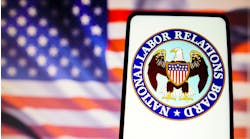Taking a direct swipe at the former Trump administration, Department of Homeland Security (DHS) Secretary Alejandro Mayorkas announced that the federal agency will no longer be mounting workplace raids aimed at arresting illegal immigrants.
“We can most effectively protect the American labor market, the conditions of the American worksite, and the dignity of the individual by focusing our worksite enforcement efforts on unscrupulous employers,” Mayorkas declared.
He also said that the Trump era raids “misallocated enforcement resources” and charged that they were sometimes used for retaliatory purposes, when workers did things like cooperate with workplace standards investigations. Under Biden, the focus instead will be on “exploitative employers” who hire unauthorized workers and who fail to comply with labor standards, such as the wage and hour laws, the DHS secretary explained.
In an Oct. 12 memo to the U.S. Citizenship and Immigration Services, Immigration and Customs Enforcement, and Customs and Border Protection agencies of DHS, Mayorkas said the department will adopt policies and practices intended to achieve the these aims:
• Reduce the demand for illegal employment by delivering more severe consequences to exploitative employers and their agents.
• Increase the willingness of workers to report violations of law by exploitative employers and cooperate in employment and labor standards investigations.
• Broaden and deepen mechanisms for coordination between DHS and the Department of Labor, Department of Justice, Equal Employment Opportunity Commission, National Labor Relations Board, and state labor agencies.
The Trump DHS had been far more aggressive than previous administrations when it came to workplace immigration raids, especially since stemming the tide of illegal immigration had been one of the President’s major policy positions during his 2016 campaign, which featured his promise to build a wall along the country’s southern border.
One complaint in the past had been that these kinds of crackdowns on these businesses often resulted in having devastating impacts on the illegal immigrants and their families, while the employers usually received only a relative slap of the wrist.
The result was that workplace raids were relatively rare under both Democrat and Republican administrations. That changed under Trump, where mass raids become much more common, and federal enforcers came down hard on business owners, imposing big penalties. The goal was to make examples of them for other employers who often relied heavily on illegal immigrant labor, showing what they could face if they didn’t clean up their acts..
Employers Are Warned
The Mayorkas memo seems to make it very clear that while employers will be targeted under immigration and labor laws, the employees are unlikely to find themselves caught in any sort of deportation process—a policy that coincides with DHS practice in dealing with other illegal immigrants who have been crossing the border en masse since Biden took office.
“Clearly, employers who violate labor standards as well as immigration law by hiring unauthorized workers are going to be targets under the new policies,” says attorney Willard Krasnow of the law firm of Constangy Brooks Smith & Prophete. “However, it is unclear what violations will cause an employer to be considered ‘exploitative.’”
According to Krasnow, the best advice that employers should take to heart is to make sure that they comply with the immigration laws and with applicable labor standards, and especially that they are complying with their obligations under the 1986 Immigration Reform and Control Act (IRCA).
Under the IRCA, an employer is prohibited from hiring, employing or continuing to employ an individual, knowing that the person is not authorized to work in the United States. You also may not hire any individual—including a U.S. citizen—for employment in the U.S. without verifying his or her identity and employment authorization on Form I-9.
Under the law, DHS requires all U.S. employers to complete Form I-9 for each individual they hire. Both employees and employers (or authorized representatives of the employer) must complete the form. The employee is required to attest to employment authorization and present the employer with appropriate identity and employment authorization documents.
The employer must examine these documents that each employee presents to determine whether they reasonably appear to be genuine and relate to the employee and record the document information on the Form I-9. Employers must retain Form I-9 for a designated period and be prepared to make it available for inspection that is requested by authorized government officers.
Employers need to keep in mind that the IRCA law imposes significant civil penalties for each person and for each violation and potentially stiff criminal penalties where an employer engages in a “pattern or practice” of hiring or recruiting, or where an agent refers for a fee individuals who are not authorized to work in the U.S.
Krasnow reminds employers that these criminal penalties can include fines of up to $3,000 for each unauthorized immigrant where each such a violation has occurred, or up to six months in prison for the entire pattern or practice, or both.
“Other non-IRCA provisions of immigration law provide more serious criminal penalties for egregious conduct often found during raids, such as evidence of trafficking, smuggling, harboring illegal aliens, document and visa fraud, and money laundering,” he stresses.
Penalties for these violations can include significant jail time as well as fines, and forfeitures of property obtained from the gains of the illegal behavior. An employer facing such charges would need the expert legal services not only of an immigration lawyer, but also of a criminal defense attorney, Krasnow points out.




